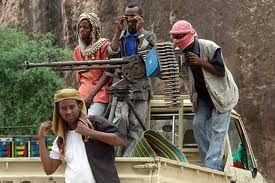
Somali gangs are taking piracy to an industrial scales and the number of seafarers killed due to piracy has escalated in the past four years with 62 merchant sailors losing
their lives through torture, execution, suicide and malnutrition, campaigners said.Somali gangs, who are making millions of dollars in ransoms, are becoming increasingly violent, and are able to stay out at sea for long periods and in all weather conditions using captured merchant vessels as mother ships.
"Sixty two seafarers have died in the past four years as a direct result of piracy in the Gulf of Aden and Indian Ocean, through deliberate murder by pirates, suicide during the period of captivity, death from malnutrition and disease, death by drowning, or heart failure just after the hijacking," said SOS SaveOurSeafarers.
SOS said two seamen were killed in 2007 as a result of pirate attacks, adding that piracy had worsened since then.
Overstretched international navies have proved unable to contain the raids in the Indian Ocean due to the vast distances involved in a crisis costing world trade billions of dollars a year."It is government inaction that has allowed piracy to spiral out of control in this area," said SOS, which is backed by the shipping and marine insurance organisations and a major workers' union.
"It's time to stop this outrage. It's time for governments to take action."SOS said during the four-year period, more than 3,500 seafarers had been kidnapped and held hostage by pirate gangs, who have used them as human shields and forced crew members to operate vessels as mother ships.
"Hundreds of these seafarers have been subjected to horrific torture including being hung by the ankles over the side of the ship, being shut in the ship's freezer room, having cable ties tightened round the genitals, being beaten, punched and kicked," said SOS chairman Giles Heimann.
"Many of these seafarers remain traumatised and unable to return to their seafaring careers long after the hijack is over, if at all."Dipendra Rathore, a 22 year-old Indian deck cadet who had been held hostage for eight months on board the Merida Marguerite vessel, said he was determined to return to sea."At my age you can still bear pain -… watching people twice my age being tortured, crying and begging for help is what really measured me," he said.
"I felt so bad for them but I could do nothing about it, except for praying."
The International Maritime Bureau (IMB) says the pirates were using hijacked vessels as bases to extend their range of operations against ships in the Indian Ocean, Arabian Sea and Gulf of Aden.The bureau's piracy reporting centre director Pottengal Mukundan says piracy has surged in recent years off Somalia, a lawless, war-torn country that sits alongside one of the world's most important shipping routes.
The IMB is concerned that some countries, which have deployed naval assets off the Horn of Africa, may cut their anti-piracy surveillance in the area.Mukundan, who is based in London, told AFP that so far this year there were 162 attacks off Somalia with 21 ships captured.
Hijackings off the coast of Somalis accounted for 61 per cent of all attacks on ships, with 362 crewmembers taken hostage, he said.Mukundan said Somali pirates were still holding 21 vessels and 405 hostages for ransom."Since 2007 there has been 62 fatalities as a result of piracy," he said, adding that "the situation is getting very serious."
"We are calling for more naval ships be made available to protect ships off Somalia," he said.Mukundan said this year despite the monsoon period (June to August), Somali pirates had escalated their attacks off the Gulf of Aden."It is an important shipping lane for very large crude carriers which sail from the Arabian Gulf to Asian countries such as Japan, China and Singapore," he said.
In previous years, there was a respite in attacks during the monsoon period due to strong winds and heavy seas.Mukundan said another worrying trend was the increase in violence against seafarers and hostages in the past six months.
In one incident, Mukundan said two senior officers were put in a ship's meat storage refrigerator for 40 minutes and in another case pirates carried out mock executions."The violence and threat used is unprecedented and unacceptable," he said.Mukundan warned that the IMB expects the number of attacks to be higher than last year.
"Pirates are getting more ransom, so they are escalating their attacks," he said.Mukundan urged countries to prosecute pirates captured at sea and not to release them."We want captured pirates to be prosecuted and punished. Now more than 80 percent of the captured pirates are freed. It is sending the wrong signal to the pirates," he said.
Source: The Citizen
We use cookies to improve your experience. By continuing to use our site, you accept our Cookies, Privacy Policy,Terms and Conditions. Close X